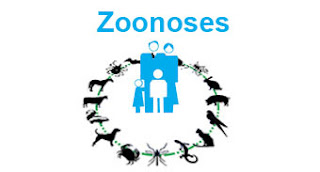Zoonoses
Zoonoses is any such infectious disease Which (in some instances, by a certain magnitude) non-human beings, both domestic and wild, Can be infected in humans or non-human animals from humans(In animals infected with humans, it is called reverse Zoonoses or anthroponoses.)The types of Zoonoses include:
- Virus
- Bacteria
- Parasites
- Fungus
Zoonotic diseases include:
- Malaria
- Orf infection
- Parrot fever
- Pasteurellosis
- Plague
- Q fever
- Rabies
- Rat-bite fever
- Ringworm
- Rocky Mountain spotted fever
- Salmonella and E. coli infections
- Streptococcal sepsis
- Swine flu
- Toxocariasis
- Toxoplasmosis
- Trichinellosis
- Animal flu
- Anthrax
- Bird flu
- Bovine tuberculosis
- Brucellosis
- Campylobacter infection
- Cat scratch fever
- Cryptosporidiosis
- Cysticercosis
- Dengue fever
- Ebola
- Encephalitis from ticks
- Enzootic abortion
- Erysipeloid
- Fish tank granuloma
- Giardiasis
- Glanders
- Hemorrhagic colitis
- Hepatitis E
- Hydatid disease
- Leptospirosis
- Listeria infection
- Louping ill
- Lyme disease
- Lymphocytic choriomeningitis
- Tularemia
- West Nile virus
- Zoonotic diphtheria
Prevention
Ways to prevent zoonotic disease include the following:- Wash your hands constantly.
- Use creepy crawly repellent or different strategies to keep mosquitos, insects, and ticks away.
- Practice safe nourishment taking care of. This incorporates washing off all deliver before eating it.
- Abstain from being chomped or scratched by a creature.
- Have your pets inoculated and take them for normal yearly visits to the veterinarian.
- Converse with your veterinarian about proper insect and tick safeguards for your pets.
- Check for ticks when you've been outside.
- Try not to eat, drink, or contact your eyes or mouth while you're taking care of or in close contact with animals.
- Use gloves on the off chance that you have to deal with a creature that is or seems, by all accounts, to be wiped out.
- Keep any regions where animals are kept perfect and sterile.
- Know about territories where animals or creepy crawlies may be the point at which you're out in nature, particularly when you partake in exercises like chasing and outdoors.
- Try not to deal with or approach any creature in the wild that seems wiped out. Make sure to contact creature control or the nearby government to have the wiped out creature evacuated.
Can Zoonoses Spread Different Ways
- Through the air
- From contaminated meat
- Through contact with infected animal
- By touching the infected animal
- Cutting mosquito or insect
- Zoonoses is a common place for spreading disease.
- People who work in farms are exposed to various types of animals.
- Animal husbandry is also a common carrier of many Zoonoses.
- Pets can be a common carrier of Zoonoses
Contributions of food-related diseases of zoonotic pathogens
The most important factors of food-related diseases are Escherichia coli O157: H7, Campylobacter, Caliciviridae, and Salmonella.At the conference organized in Berlin in 2006, focused on the issue of the effect of zoonotic microbes on food security In which the governments were urged to intervene in this problem And the public was asked to be vigilant about diseases caused by food risk through the field of food from the farm.
Partial list of carriers
A partial list of infectious organisms agents that may be zoonotic are listed below Xenozoonosis is Zoonoses transmitted by xenotransplantation:- Bat
- The bird
- Cats
- Cattle
- Chimpanzee
- Dogs
- Fish
- Flea
- The Flies
- Geese
- Goat
- Hamsters
- The horse
- Human
- High Res
- Louse
- Rat
- Monkey
- Mosquito
- Opsom
- The Pig
- Rabbit
- Raccoon
- Rodent
- Laziness
- The sheep
- Snail
- Tic
- The wolf
List of infectious agents
Zenos can be listed according to infectious agent.- Parasites (protozoa, helminthus seasts and tromometodes)
- Fungus
- Bacterium
- Virus (virus)


Post a Comment